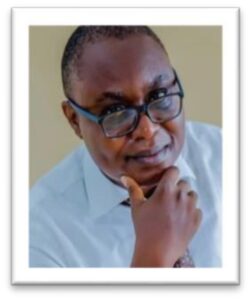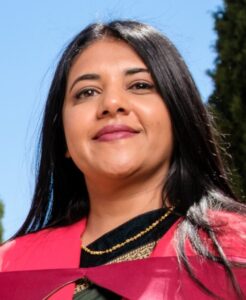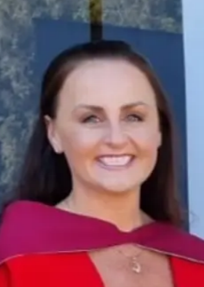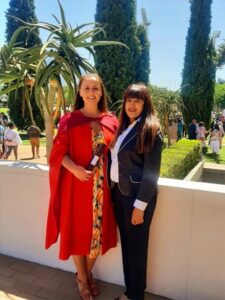[:en]At the Stellenbosch University December 2022 graduation ceremony, the Department of Psychiatry, Faculty of Medicine and Health Sciences had 3 PhD graduates:

Dr Jaiyeola A. Kajero investigated the potential attenuating effects of cannabidiol (CBD) on antipsychotic-induced vacuous chewing movements, behavioural and biochemical aberrations, and cognitive and negative symptoms of schizophrenia in rodent models of tardive dyskinesia and psychosis.
Supervisor: Prof S Seedat (SU). Co-supervisors: Drs O Aina (NIMR), A Akindele (Univ. of Lagos), Prof J Ohaeri (Univ. of Nigeria Teaching Hospital).

Dr Anusha Lachman investigated the shared pleasure paradigm in mothers with and without mental illness and their young infants in a clinical and community setting in the Western Cape. The study included a range of neurodevelopmental, infant withdrawal and maternal mental health variables.
Supervisor: Prof DJH Niehaus (SU). Co-supervisor: Prof K Puura (Tampere Univ.)

Dr Eileen Vuong investigated the potential role of adiponectin in predicting the onset of posttraumatic stress disorder and cardiometabolic disease in female rape survivors early after rape.
Supervisor: Prof S Seedat (SU). Co-supervisors: Profs N Abrahams (SAMRC), SMJ Hemmings (SU), N Peer (SAMRC)
These are some of the insights these graduates about their PhD journey and their future research endeavours:
What have been some of the highs and lows of your PhD journey?
Kajero: At almost every stage of the journey there were obstacles to be surmounted, the difficulties encountered in procuring the experimental drugs almost made me lose hope, the experimental procedures were quite tedious and data analysis was laborious to say the least, there were initial challenges with the publication of the results too, but every accepted manuscript renewed my confidence and gave me immeasurable joy.
 Lachman: Highlights – exploring a new field and contributing to a subject that has very little local expertise or research. Opportunities for support in terms of scholarships and exchange programs. Lows – challenging for a full-time clinician to equally focus on a PhD research commitment.
Lachman: Highlights – exploring a new field and contributing to a subject that has very little local expertise or research. Opportunities for support in terms of scholarships and exchange programs. Lows – challenging for a full-time clinician to equally focus on a PhD research commitment.
Vuong: I prefer to view “lows” as “challenges encountered”. For myself, completing a PhD whilst in full-time clinical practice posed a challenge, outside of other duties, roles, and changes (for example being a mom, wife, completing another fellowship, starting a private practice, and emigrating to a new country). The COVID pandemic certainly created a unique set of challenges and setbacks, navigating lockdowns, and illness among study team members. In addition, as my study entailed the examination of DNA and serum samples, the COVID pandemic resulted in significant delays in the shipment and processing of samples. I had anticipated that emigrating to a new country would be the most challenging part, however in the end, it was in my favour. Given that New Zealand (give or take daylight savings time) is an average of 10 hours ahead of South African time, I was able to complete writing and analyses in the morning, send it off to my supervisors, work and live my usual day and have a response ready the next morning, thus maintaining a good momentum.
The highs – there are so many. First, I feel so incredibly grateful to have had the opportunity to be part of such an amazing study. The parent study, the Rape Impact Cohort Evaluation (RICE) study is the first of its kind and will generate seminal and novel data regarding the mental and physical health outcomes of rape victims. I was also very lucky to have four incredible supervisors, who were always generous in their support and advice. I also had support from other members of the RICE research team. The study generated novel and interesting findings and I was very fortunate to have several papers published.
What advice would you give to someone who is considering a PhD in Psychiatry?
Kajero: The PhD topic should be in an area that you find interesting so the student won’t get easily bored and frustrated and your proposal should be precise and well-focused. The choice of supervisor is also important.

Lachman: Try and focus on an area that is part of your everyday working and clinical exposure. If you are not interested or excited by the subject of your PhD it can become very difficult to stay motivated or focussed on completing it. Find PhD-support colleagues – others also on the same journey, as it becomes invaluable to have peer support and advice during the PhD.
Vuong: Luck favours the prepared. A PhD is a huge but very rewarding undertaking. Spend sufficient time clarifying clear research questions and write a good protocol- this will serve you well. Celebrate every small milestone because it is a long journey. For example, writing your protocol, getting Ethics approval, finishing a manuscript draft. Be organised and use available time wisely. Ask many questions and speak to many experts and researchers conducting similar research as you are considering, it will keep you humble and motivated. Lastly, don’t neglect your health, wellbeing, family, and friends. A PhD requires a lot of time, dedication, and sacrifices. A balanced approach is essential and achievable. Be kind to yourself and enjoy the journey!
Do you have any plans in the near future to build on the knowledge and experience gained from your PhD?
Kajero: I would love to continue working as a behavioural pharmacologist and at the same time gain more knowledge on genetics. The interaction between the genes, their chemical products and the environment is an area worth studying because of its therapeutic potential.
Lachman: I would like to implement the findings of the work and hopefully expand the investigation to other settings, but with a focus on interrogating the finding with additional studies (either post doc or with another student research) on the Shared Pleasure tool. Experience of being supervised by very supportive and encouraging supervisors will hopefully lead to me being a similar kind of supervisor to future students of mine.
Vuong: I will continue to work as a clinician researcher, with a focus on women’s mental health and traumatology. I hope to keep ties with the SARChI Chair in Posttraumatic Stress Disorder (PTSD) group whilst residing in Australasia and foster new research collaborations. I plan to continue acting as an examiner for student research projects and reviewer for psychiatry journals. Part of my current clinical role entails supervision of medical students and registrars, so I am very keen to hopefully inspire and encourage others to get involved in research.

[:]
